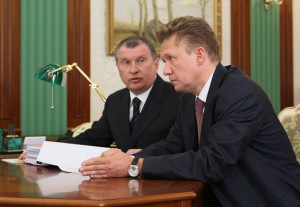Update: Energy Minister Wants to Maintain Monopoly
Alexander Novak, the Energy Minister of the Russian Federation, came out in favor of continuing Gazprom’s monopoly of exporting pipeline natural gas on July 28, reports Russian news agency Tass. “We are focusing on maintaining a single export channel,” he said at a Chamber of Commerce meeting.
A letter sent by Rosneft to Russia Energy Minister asked for the right to export gas via pipeline and split up the company into separate production and transportation companies
Russia’s largest oil producer Rosneft (ticker: RNFTF) has asked the Russian government to allow it to export gas through pipelines, putting an end to the export monopoly held by Russian state-owned Gazprom (ticker: OGZPY). In a letter sent to the Energy Ministry, Rosneft has also asked that Gazprom be split into separate producing and transportation companies, reports The Moscow Times.
Rosneft has proposed the spin off in order to avoid a conflict of interest, it says. “The conflict of interests within Gazprom, which is a monopoly in transportation services on one hand and which is the largest gas supplier on the other hand, should be eliminated,” said a company spokesman. Gazprom has resisted such a split up to this point.
Gazprom is seeing record-low production as demand for its gas in international markets, as well as at home in Russia, declines. The company’s output in June fell by 19% compared to the same month in 2014 to 24.7 Bcm. Rigid pricing set by the government is making Gazprom increasingly uncompetitive against companies like Rosneft and Russia’s number two gas producer, Novatek.
The letter from Rosneft may signal the company’s growing discomfort over its own business situation, which is being hampered by international sanctions as well as Gazprom’s monopoly. In 2013, the company accounted for 40% of Russia’s oil production, and it has set the goal to increase its hydrocarbon production by 20% by 2020.
Many of Gazprom’s largest customers have been trying to reduce their imports of Russian gas. Both Ukraine and the European Union are diversifying their energy imports away from Russia as political tensions continue to worsen. Exports of Gazprom’s gas abroad have fallen 8% in the first half of the year compared to the same period last year.
Foreign sales account for two-thirds of Gazprom’s revenue, said Valery Nesterov, oil and gas analyst at Sberbank CIB, a Russian investment bank. Gazprom sells half of its gas inside of Russia, but domestic prices are kept low through regulations. The company will likely be very reluctant to give up its export monopoly if it means losing such lucrative market share. Sberbank expects Gazprom to generate roughly $105.8 billion this year, down 27% from 2014.


